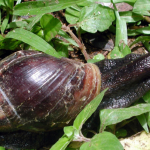Plus giant land snails and a Florida tsunami
News of a strange tsunami that snuck up on Clearwater Beach late last month, the latest risks facing the construction and engineering sectors as construction accelerates, plus another quarantine is in effect for the stucco-eating Giant African Land Snail – oh my! It’s all in this week’s Environment & Engineering Digest.
 Tsunami: The unusual heat in Texas blowing warmer winds eastward across the Gulf of Mexico toward Florida created an unusually strong squall line that resulted in a meteotsunamis crashing along the coast of Clearwater Beach the week after Father’s Day. Unlike the potentially deadly tsunamis triggered by earthquakes, this meteotsunami created rare four-foot waves for upward of an hour. The meteotsunami was about 2½ feet higher than the forecast wave height and around four feet higher than average sea level. Paul Close, senior forecaster at the National Weather Service in Tampa, says that when there’s a line of storms over the Gulf, there can be 30-50 mph winds near the leading edge. The winds push the water, with higher wave heights near the coast that eventually crash onto the beach. Although there was indeed a rare seafloor earthquake in the Gulf of Mexico in early June. The 3.3 magnitude quake occurred about 130 miles southeast of Gulfport, Mississippi.
Tsunami: The unusual heat in Texas blowing warmer winds eastward across the Gulf of Mexico toward Florida created an unusually strong squall line that resulted in a meteotsunamis crashing along the coast of Clearwater Beach the week after Father’s Day. Unlike the potentially deadly tsunamis triggered by earthquakes, this meteotsunami created rare four-foot waves for upward of an hour. The meteotsunami was about 2½ feet higher than the forecast wave height and around four feet higher than average sea level. Paul Close, senior forecaster at the National Weather Service in Tampa, says that when there’s a line of storms over the Gulf, there can be 30-50 mph winds near the leading edge. The winds push the water, with higher wave heights near the coast that eventually crash onto the beach. Although there was indeed a rare seafloor earthquake in the Gulf of Mexico in early June. The 3.3 magnitude quake occurred about 130 miles southeast of Gulfport, Mississippi.
 Construction Industry Risks: Allianz Global Corporate & Security is out with its construction sector report, Global Industry Solutions Outlook: Construction. It lists business interruption and supply chain disruptions as the top risk facing the construction and engineering sector this year. The sector, as we know, has been hugely impacted by soaring construction costs, supply chain interruptions, and labor shortages. The report ranks natural catastrophes as the second highest risk for the sector, followed by the energy crisis (described as supply shortage/outage and price fluctuations) with the growing emphasis on transition to renewable energy.
Construction Industry Risks: Allianz Global Corporate & Security is out with its construction sector report, Global Industry Solutions Outlook: Construction. It lists business interruption and supply chain disruptions as the top risk facing the construction and engineering sector this year. The sector, as we know, has been hugely impacted by soaring construction costs, supply chain interruptions, and labor shortages. The report ranks natural catastrophes as the second highest risk for the sector, followed by the energy crisis (described as supply shortage/outage and price fluctuations) with the growing emphasis on transition to renewable energy.
 Giant African Land Snails: It’s Florida after all, so the threats from weather and invasive species seem to know no end and now it’s snails – again. A 260-block area of Broward County near the North Perry Airport are under quarantine from the Giant African Land Snail. The Florida Department of Agriculture and Consumer Services reports the snails were discovered in early June and lists them as one of the most damaging pests in the world. They can grow as large as rats and along with plants, eat stucco, plastic, and other building materials. They can also carry rat lungworm, a known cause of meningitis. It’s against the law to move the snails or plants, soil, yard waste or building materials where the snails may have laid eggs, without a permit. Last summer, we reported on a similar quarantine in the city of New Port Richey in Pasco County.
Giant African Land Snails: It’s Florida after all, so the threats from weather and invasive species seem to know no end and now it’s snails – again. A 260-block area of Broward County near the North Perry Airport are under quarantine from the Giant African Land Snail. The Florida Department of Agriculture and Consumer Services reports the snails were discovered in early June and lists them as one of the most damaging pests in the world. They can grow as large as rats and along with plants, eat stucco, plastic, and other building materials. They can also carry rat lungworm, a known cause of meningitis. It’s against the law to move the snails or plants, soil, yard waste or building materials where the snails may have laid eggs, without a permit. Last summer, we reported on a similar quarantine in the city of New Port Richey in Pasco County.
LMA Newsletter of 7-10-23

